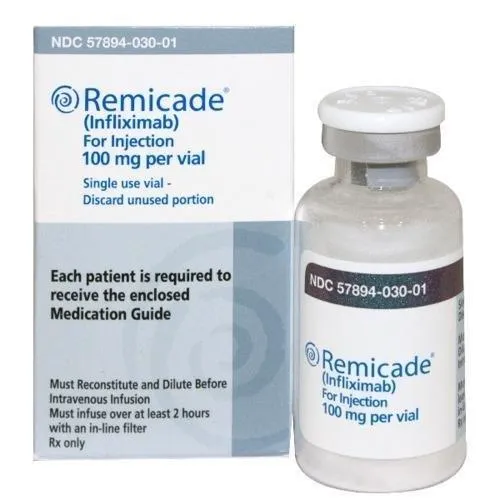Comprehensive Guide to Infliximab: Uses, Dosage, Side Effects, and More
What is Infliximab?
Overview of Infliximab
Generic Name: Infliximab
Brand Name: Remicade, Inflectra, Renflexis, generics
Drug Group: TNF inhibitor (biologic immunosuppressant)
Commonly Used For
- Treat rheumatoid arthritis (RA).
- Manage Crohn’s disease.
- Alleviate ulcerative colitis (UC).
Key Characteristics
Form: Intravenous infusion (100 mg vial, reconstituted for administration) (detailed in Dosage section).
Mechanism: Binds TNF-alpha, preventing its interaction with cell surface receptors, thus reducing inflammation.
Approval: FDA-approved (1998 for Remicade) and EMA-approved for multiple inflammatory conditions.

Indications and Uses of Infliximab
Infliximab is indicated for a variety of autoimmune and inflammatory conditions, leveraging its TNF-alpha inhibition:
Rheumatoid Arthritis (RA): Reduces joint inflammation and slows disease progression in combination with methotrexate, per rheumatology guidelines, supported by clinical trials showing a 50% improvement in ACR scores.
Crohn’s Disease: Induces and maintains remission in moderate to severe cases, including fistulizing disease, recommended in gastroenterology protocols with evidence of mucosal healing.
Ulcerative Colitis (UC): Manages moderate to severe UC, reducing steroid dependence, with gastroenterology data.
Ankylosing Spondylitis (AS): Alleviates spinal inflammation and improves mobility, per rheumatology studies.
Psoriatic Arthritis (PsA): Treats joint and skin symptoms, enhancing quality of life, with dermatology-rheumatology evidence.
Plaque Psoriasis: Controls moderate to severe skin lesions, supported by dermatology trials.
Juvenile Idiopathic Arthritis (JIA): Investigated off-label to manage polyarticular JIA, with pediatric rheumatology data.
Sarcoidosis: Explored off-label for pulmonary and ocular manifestations, with pulmonology research.
Behçet’s Disease: Managed off-label to reduce ocular and mucocutaneous inflammation, with rheumatology evidence.
Hidradenitis Suppurativa: Initiated off-label to control severe nodular lesions, with dermatology studies.
Dosage of Infliximab
Dosage for Adults
Rheumatoid Arthritis (RA): 3 mg/kg IV at weeks 0, 2, and 6, then every 8 weeks; may increase to 10 mg/kg based on response.
Crohn’s Disease: 5 mg/kg IV at weeks 0, 2, and 6, then every 8 weeks; may adjust to 10 mg/kg for loss of response.
Ulcerative Colitis (UC): 5 mg/kg IV at weeks 0, 2, and 6, then every 8 weeks; consider 10 mg/kg if remission is not achieved.
Ankylosing Spondylitis (AS), Psoriatic Arthritis (PsA), Plaque Psoriasis: 5 mg/kg IV at weeks 0, 2, and 6, then every 6–8 weeks.
Dosage for Children (≥6 years)
Crohn’s Disease or UC: 5 mg/kg IV at weeks 0, 2, and 6, then every 8 weeks, under pediatric gastroenterology supervision.
JIA (Off-Label): 3–6 mg/kg IV, adjusted based on response, with pediatric rheumatology oversight.
Dosage for Pregnant Women
Pregnancy Category B: Use only if benefits outweigh risks; consult an obstetrician and specialist, with fetal monitoring.
Dosage Adjustments
Renal Impairment: No adjustment needed; monitor for rare systemic effects.
Hepatic Impairment:
Mild to moderate (Child-Pugh A or B): Use cautiously; severe (Child-Pugh C): Avoid due to limited data.
Concomitant Medications: Adjust if combined with other immunosuppressants (e.g., azathioprine); monitor for infections.
Elderly: No specific adjustment; assess infection risk and comorbidities.
Immunogenicity: Increase dose or frequency if antibodies develop, confirmed by drug level testing.
Additional Considerations
- Administer this active ingredient as an IV infusion over 2 hours in a controlled setting.
- Premedicate with antihistamines or corticosteroids if prior infusion reactions occurred.
- Monitor for signs of infection or hypersensitivity during and post-infusion.
How to Use Infliximab
Administration:
IV Infusion: Reconstitute 100 mg vial with 10 mL sterile water, dilute in 250 mL 0.9% saline, and infuse over 2 hours via pump.
Administer in a healthcare facility with resuscitation equipment available.
Timing: Follow the induction schedule (weeks 0, 2, 6) and maintenance every 6–8 weeks.
Monitoring: Observe for fever, rash, or shortness of breath during infusion; report immediately.
Additional Tips:
- Store vials at 2–8°C (36–46°F), protect from light; do not freeze or shake.
- Keep out of reach of children; handle with aseptic technique.
- Educate patients on infection prevention (e.g., hand hygiene, avoiding crowds).
- Schedule pre-infusion screening for tuberculosis (TB) and hepatitis B every 6 months.
- Provide post-infusion observation for 1–2 hours to monitor for delayed reactions.
Contraindications for Infliximab
Hypersensitivity: Patients with a known allergy to Infliximab, murine proteins, or other components.
Active Tuberculosis (TB): Contraindicated until treated, due to reactivation risk.
Severe Infections: Avoid in sepsis or opportunistic infections (e.g., histoplasmosis).
Moderate to Severe Heart Failure (NYHA Class III/IV): Contraindicated due to worsening risk.
Demyelinating Disease: Avoid in multiple sclerosis or optic neuritis due to exacerbation potential.
Live Vaccines: Contraindicated within 3 months of administration due to immunosuppression.
Malignancy: Avoid in patients with recent or active cancer (e.g., lymphoma) unless benefits outweigh risks.
Warnings & Precautions for Infliximab
General Warnings
Serious Infections: Risk of TB, fungal (e.g., candidiasis), or bacterial infections; screen before and during therapy.
Malignancy: Increased risk of lymphoma and skin cancer; monitor with regular dermatology exams.
Infusion Reactions: Risk of anaphylaxis or delayed hypersensitivity; premedicate if history exists.
Hepatotoxicity: Risk of liver injury or hepatitis B reactivation; check liver function tests.
Heart Failure: Worsening in existing cases; discontinue if symptoms appear.
Additional Warnings
Neurologic Events: Rare demyelinating disorders; discontinue if neurological symptoms arise.
Autoimmune Hepatitis: Risk with prolonged use; monitor liver enzymes.
Blood Disorders: Risk of aplastic anemia or leukopenia; check CBC regularly.
Lupus-Like Syndrome: Rare development; stop if symptoms (e.g., rash, joint pain) occur.
Hypersensitivity Reactions: Rare severe reactions (e.g., serum sickness); manage with corticosteroids.
Use in Specific Populations
Pregnancy: Category B; use with caution, monitoring fetal development.
Breastfeeding: Use caution; monitor infant for immunosuppression.
Elderly: Higher infection risk; adjust based on comorbidities.
Children: Safe for approved indications with pediatric oversight.
Renal/Hepatic Impairment: Adjust or avoid in severe cases with monitoring.
Additional Precautions
- Inform your doctor about TB exposure, cancer history, or heart conditions before starting this medication.
- Avoid live vaccines during therapy; update immunizations prior to initiation.
- Use protective measures (e.g., sunscreen) to reduce skin cancer risk.
Overdose and Management of Infliximab
Overdose Symptoms
- Mild infusion reactions (e.g., flushing, headache) or increased infection risk.
- Severe cases: Cytokine release syndrome, severe hypotension, or multi-organ failure.
- Fever, chills, or rash as early signs.
- Rare coma or profound immunosuppression with extremely high doses.
Immediate Actions
Contact the Medical Team: Seek immediate medical help if severe symptoms occur.
Supportive Care: Discontinue infusion, provide IV fluids, and manage symptoms (e.g., antihistamines for reactions).
Specific Treatment: No specific antidote; use corticosteroids or epinephrine for anaphylaxis under specialist guidance.
Monitor: Check vital signs, infection markers, and liver function for 24–48 hours.
Patient Education: Advise against self-administering additional doses and to report accidental over-infusion.
Additional Notes
- Overdose risk is low with controlled IV administration; monitor closely during infusion.
- Report persistent symptoms (e.g., high fever, severe rash) promptly to prevent complications.
Side Effects of Infliximab
Common Side Effects
- Infusion Reactions (10–20%, flushing or headache, managed with premedication)
- Infections (5–15%, upper respiratory, treated with antibiotics)
- Fatigue (5–10%, improves with rest)
- Nausea (3–8%, relieved with antiemetics)
- Abdominal Pain (2–6%, decreases with time)
These effects may subside with adaptation or dose adjustment.
Serious Side Effects
Seek immediate medical attention for:
- Infectious: TB reactivation, sepsis, or opportunistic infections (e.g., Pneumocystis).
- Malignant: Lymphoma or melanoma development.
- Cardiac: Worsening heart failure or myocardial infarction.
- Hepatic: Severe hepatitis or liver failure.
- Allergic: Anaphylaxis or serum sickness (rare).
Additional Notes
Regular monitoring with TB skin tests, chest X-rays, and liver function tests every 3–6 months is essential.
Patients with a history of hepatitis B should receive antiviral prophylaxis during therapy.
Report any unusual symptoms (e.g., persistent cough, jaundice) immediately to a healthcare provider to address infections or liver issues.
Long-term use (>1 year) requires annual cancer screening and neurologic assessments.
Drug Interactions with Infliximab
This active ingredient may interact with:
- Live Vaccines: Increases infection risk; avoid during therapy.
- Immunosuppressants: Enhances immunosuppression (e.g., methotrexate); monitor closely.
- TNF Inhibitors: Avoid combining with other TNF blockers due to additive risks.
- Antibiotics: May mask infection symptoms; use cautiously.
- CYP450 Substrates: No significant interaction, but monitor for rare effects.
Action: Provide your healthcare provider with a complete list of medications.
Patient Education or Lifestyle
Medication Adherence: Use this TNF inhibitor as prescribed for inflammatory conditions, following infusion schedules.
Monitoring: Report infections, rash, or signs of heart failure immediately.
Lifestyle: Avoid crowds during flu season; maintain good hygiene.
Diet: No specific restrictions; ensure adequate nutrition.
Emergency Awareness: Know signs of severe infection or reaction; seek care if present.
Follow-Up: Schedule regular check-ups every 3–6 months to monitor infections, liver, and malignancy risk.
Pharmacokinetics of Infliximab
Absorption: IV administration, no oral bioavailability; peak effect at end of infusion.
Distribution: Volume of distribution ~3–6 L; binds to TNF-alpha in tissues.
Metabolism: Degraded via proteolytic pathways; no specific hepatic metabolism.
Excretion: Eliminated as peptides via reticuloendothelial system; half-life 8–10 days.
Half-Life: 8–10 days, with accumulation over multiple doses.
Pharmacodynamics of Infliximab
This drug exerts its effects by:
Neutralizing soluble and membrane-bound TNF-alpha, reducing inflammatory cytokine release.
Inducing apoptosis in TNF-expressing cells, alleviating autoimmune activity.
Exhibiting dose-dependent risks of infections and immunogenicity.
Storage of Infliximab
- Temperature: Store at 2–8°C (36–46°F); protect from light and freezing.
- Protection: Keep in original carton, away from heat and humidity.
- Safety: Store in a secure location out of reach of children and pets due to biologic risk.
- Disposal: Dispose of unused vials per local regulations or consult a pharmacist.
Frequently Asked Questions (FAQs)
Q: What does Infliximab treat?
A: This medication treats rheumatoid arthritis and Crohn’s disease.
Q: Can this active ingredient cause infections?
A: Yes, infections are common; report if severe.
Q: Is Infliximab safe for children?
A: Yes, for approved uses with supervision.
Q: How is this drug taken?
A: Via IV infusion, as directed.
Q: How long is Infliximab treatment?
A: Typically ongoing, every 6–8 weeks after induction.
Q: Can I use Infliximab if pregnant?
A: Yes, with caution; consult a doctor.
Regulatory Information
This medication is approved by:
U.S. Food and Drug Administration (FDA): Approved in 1998 (Remicade) for RA and Crohn’s disease.
European Medicines Agency (EMA): Approved for RA, Crohn’s, UC, and other conditions.
Other Agencies: Approved globally for autoimmune therapy; consult local guidelines.
References
- U.S. Food and Drug Administration (FDA). (2023). Remicade (Infliximab) Prescribing Information.
- Official FDA documentation detailing the drug’s approved uses, dosage, and safety.
- European Medicines Agency (EMA). (2023). Infliximab Summary of Product Characteristics.
- EMA’s comprehensive information on the medication’s indications and precautions in Europe.
- National Institutes of Health (NIH). (2023). Infliximab: MedlinePlus Drug Information.
- NIH resource providing detailed information on the drug’s uses, side effects, and precautions.
- World Health Organization (WHO). (2023). WHO Model List of Essential Medicines: Infliximab.
- WHO’s consideration of Infliximab for autoimmune diseases.
- Annals of the Rheumatic Diseases. (2022). Infliximab in RA.
- Peer-reviewed article on Infliximab efficacy (note: access may require a subscription).
